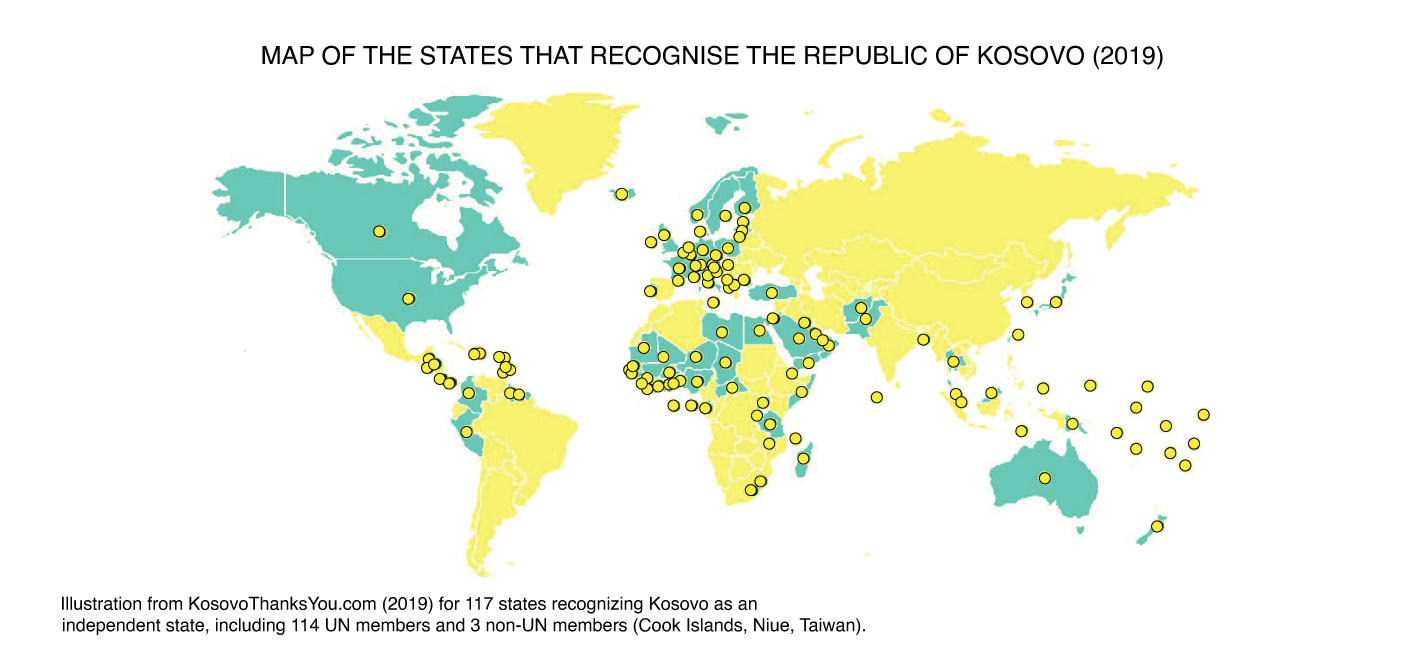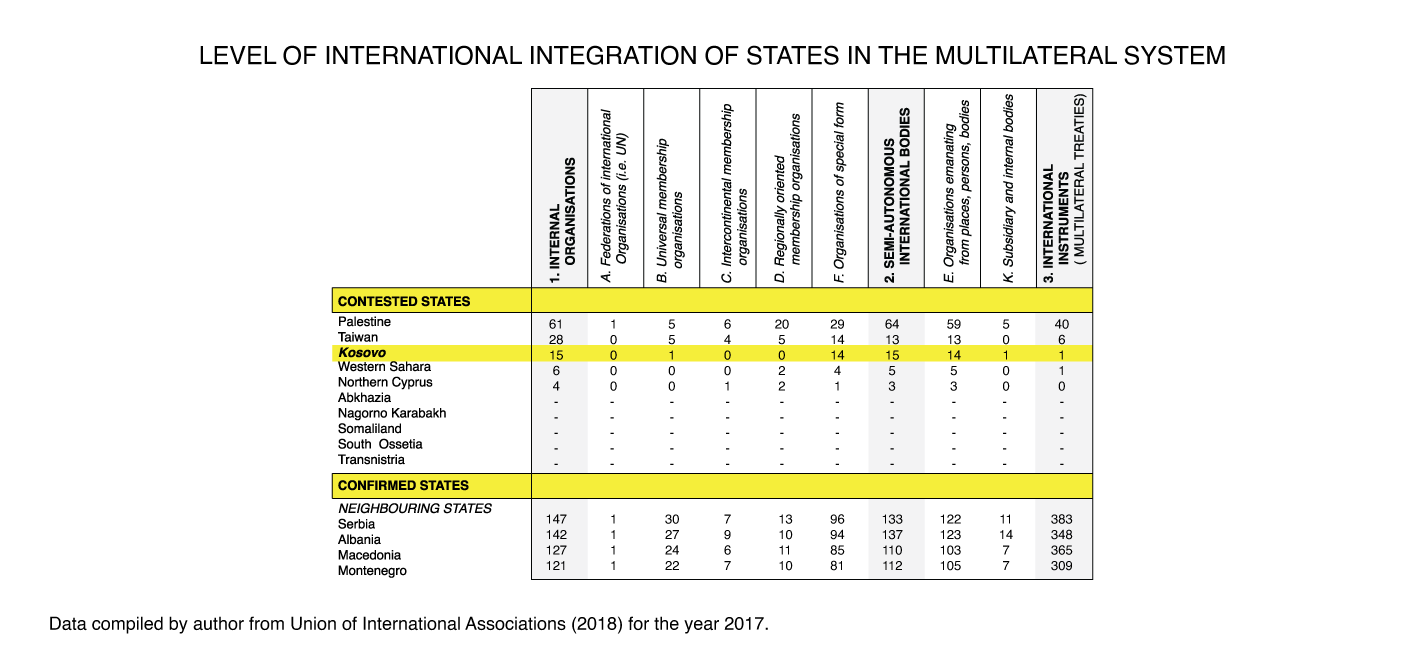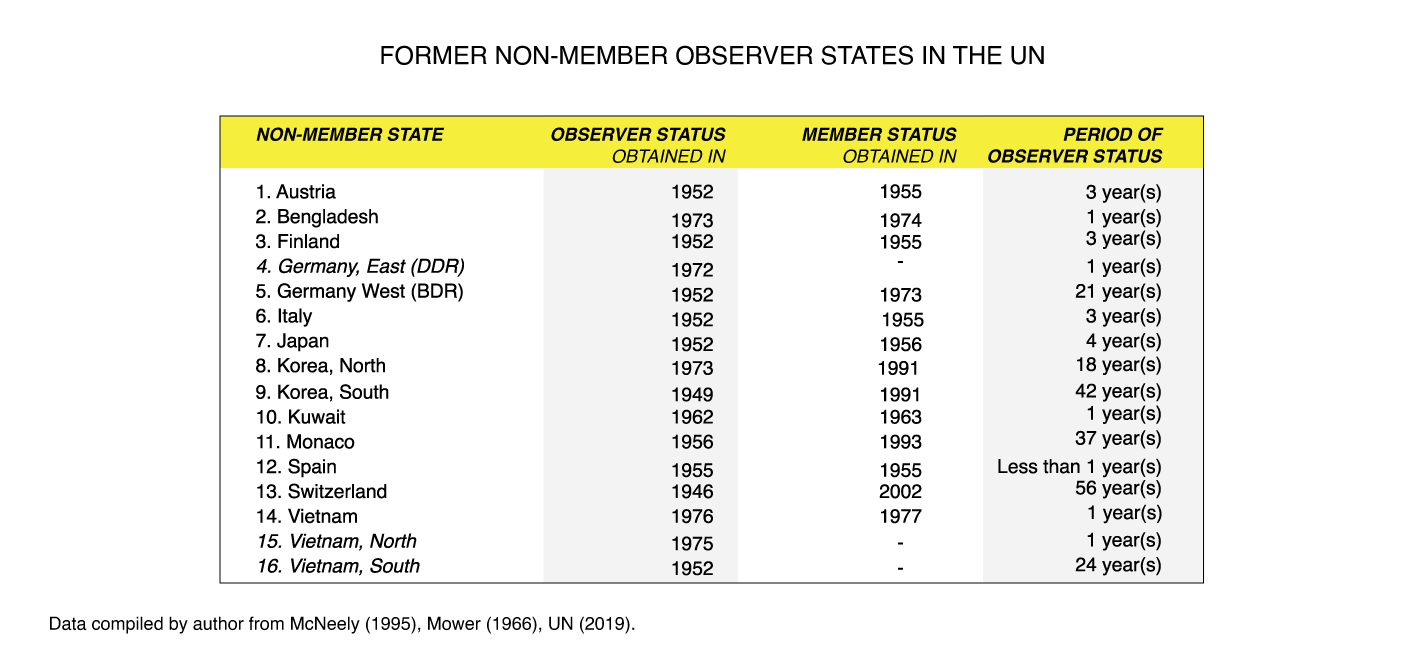Kosovo has been engaged in talks and negotiations with Serbia of various shapes and forms for over two decades now over the prospective settlement of their bilateral disputes surrounding the status of Kosovo. The consecutive failures of these talks have resulted in 2008 with the declaration of independence by Kosovo, which was closely coordinated with and approved by the Western and European community of states — and most notably the U.S.
Yet the lack of a consensual agreement between Kosovo and Serbia led to the division of the wider international community regarding the recognition of Kosovo’s statehood. This disunity among the international community has condemned Kosovo to a twilight existence in the international area often at the margins of the international system due to not being a member of the UN, the membership of which has come to be perceived as a ‘birth certificate’ of states.
As a consequence, Kosovo and Serbia have been re-engaged in talks mediated by the EU since 2011 in an effort to reach a consensual and comprehensive settlement of their dispute(s). This dialogue, however, has been a prolonged and protracted one with no end in sight and plagued by various shortcomings and obstacles. This has inadvertently paved the way for the emergence of quick deal solutions, involving but not limited to the infamous and previously precluded topic of exchanges of territories.
Ahead of the long-trumpeted high-level meeting with the representatives of Kosovo and Serbia in the White House on September 3 and 4 in the wake of the U.S. administration’s recent engagement and reinvigoration of efforts to broker a deal between the parties, an assessment as to what may await Kosovo under a deal and no-deal scenario is due.
I will try to elaborate what a ‘no deal’ scenario might mean for Kosovo — a scenario that has been subject to various interpretations and occasional manipulations. The analysis of a no-deal scenario is important, as its proper assessment can provide clarity when it comes to evaluating the conditions of a prospective deal, namely whether the benefits of the deal are worth the concessions that Kosovo may have to make.
Moreover, it is difficult to analyze a deal scenario without entering into speculation as to what such a deal may entail or whether a deal is likely, considering the lack of transparency of the process in general and the topics of discussion in particular. Nonetheless, it can be presumed that a deal of some sort will be made — perhaps in a similar vein to the recent Israel-UAE normalization deal — as U.S President Donald Trump’s ‘pushy peacemaker’ policy ahead of the upcoming U.S. elections in November and his craving for foreign policy success trophies hint to that.
A no-deal scenario has been generally viewed in a negative light, as it is brought in connection with the status quo, which is considered unsustainable due to its potential for instability and unpredictability. I would like to paint a somewhat brighter picture of a no-deal scenario in the short and medium term, and challenge the generally perceived view of the negative implications that a failure to come to an agreement with Serbia may bring for Kosovo.
This by no means suggests that Kosovo should not aim to reach a settlement with Serbia in the future. However, shedding light into the available options and alternatives, especially if they are favorable, would improve Kosovo’s bargaining position in prospective negotiations and help avoid deficiencies of a potentially hurried deal or settlement. In essence, Kosovo’s prospective future in the international system in a scenario where recognition by Serbia is protracted endlessly or remains elusive for a longer period of time should be considered, and analyzed.
Challenges under conditions of international contestation
At the heart of Kosovo’s challenges in the international system lies its impediment to achieve comprehensive international integration, for which none is more important than the UN system. The UN has come to be understood as a reference to the international community due to its paramount role for maintaining international peace and security, fostering economic and social development, promoting and protecting human rights, and regulating international relations in general.
However, UN membership remains elusive to Kosovo under the conditions of international contestation of its statehood. As a matter of fact, no state has in recent history been able to join the UN as an equal member without the consent of its former predecessor state. There is also no universally recognized state today that is not a member of the UN. Based on this and having in mind the opposition by Russia and China as permanent members and veto powers in the UN Security Council, Kosovo’s prospects of becoming a UN member without a prior settlement with Serbia are dim, if not practically nonexistent.
Similarly, membership in NATO remains elusive under the status quo due to the veto power of each member state. As the NATO Deputy Assistant Secretary General, James Appathurai, in a recent interview noted “without all countries in the Alliance recognizing Kosovo, it cannot join — that is a very simple and straightforward point that anyone can understand”, adding that “the only way for Kosovo to join NATO is that there is a successful resolution of the Belgrade-Pristina dialogue.”
Yet the lack of UN membership does not imply that a state does not meet the criteria of statehood, as it is possible that it may (choose to) remain outside the UN. This was the case, for instance, with Switzerland until quite recently, which for its neutrality decided not to obtain membership until 2002 but chose to remain a permanent observer without compromising its full-fledged statehood.
Needless to say, there is sufficient intellectual force — and not only — to argue that Kosovo is a state. It fulfils the criteria generally associated with statehood in international law, such as the ones inscribed in the Montevideo Convention. Moreover, Kosovo’s declaration of independence has been deemed lawful, or not unlawful, by the International Court of Justice (ICJ).

While satisfying the statehood criteria endows an entity with rights and duties under international law, recognition can affect the degree to which those rights and obligations can be exercised. It is for this reason that new emerging states and contested states aspire UN membership, wishing to avoid the arbitrariness, struggle and uncertainty of seeking bilateral recognition.
Remaining outside the UN system has, as such, been a great hindrance for Kosovo for securing equal treatment in the international arena. Pending a settlement with Serbia, Kosovo is left to pursue a lengthy struggle for diplomatic recognition on a country-by-country basis to gradually increase its international integration. This status quo is characterized by uncertainty, especially due to continuous disagreements, distrust and hostility among Kosovo and Serbia, but also with respect to growing rivalries among great powers, rising nationalism and populist right-wing politics, and the lack of unity within the EU towards, but not limited, to the status of Kosovo.
This raises the question whether Kosovo must act soon to reach a deal with Serbia to secure its standing as an equal member in the international system, or whether this trumpeted urgency may just be imagined and serve more the narrow interests of certain actors than those of Kosovo?
To answer this question in the most objective way possible, it would be necessary to see first where Kosovo currently stands and how much it can progress from there on its own. One way to understand this is by looking at Kosovo’s level of integration in the international system and comparing it with the level of integration of other related states in order to put it into perspective and analyze how much room there is for improvement.

Kosovo’s international integration measured in its participation in international organizations and instruments (e.g. multilateral treaties) pales when it comes to comparing it with universally recognized states, such as other states in the Balkans region and particularly compared to its neighboring states, Albania and Serbia. This showcases the apparent limitations to Kosovo’s international integration under the status quo. Its participation in the multilateral system is just a fraction of that of Albania or Serbia when comparing the organizations in which they participate. With respect to international instruments, the difference is in hundred-fold.
Another objective way to look at this matter is by considering the precedents set by other contested states in terms of international integration. Compared to other contested states present in the international system today, Kosovo lags behind Taiwan and Palestine in terms of international participation as well. As these states have been contested for a far longer period than Kosovo and similarly aspiring recognition, this comparison is highly indicative of the limitations that may await Kosovo in its international endeavors, especially when considering the case of Palestine that is recognized by even more states than Kosovo, that is 137 states.
Although each contested state has its specific particularities and unique trajectories with regard to their respective emergence and their historical, political, normative or legal pathway to statehood, commonalities and similarities among them are unquestionable — particularly related to their struggle for independence, the opposition by their former states, and their lack of and quest for universal recognition.
Kosovo’s most noticeable deficit in the international plane seems its participation in international instruments. This clearly demonstrates the limitations that states under conditions of international contestation have in the multilateral system; in the case of Kosovo, it also hints to non-utilized or underutilized opportunities based on the achievements of other contested states.
Venues for further integration and advancement
So, how can Kosovo further its international standing under the status quo of a no-deal scenario?
Despite the impediments, there are two ways how Kosovo can substantially increase its presence and participation in the UN system under the status quo. On the one hand as a permanent observer state, such as the Vatican and Palestine currently or 14 former observer states in the past (including Germany, Austria, Italy, Japan, Finland, Monaco, to name a few). On the other hand, in regard to membership in some of the 15 UN specialized agencies, as they have their own structures, rules and members.

Permanent observer status
Having permanent observer status — that is, as an observer ‘state’, not an observer ‘entity’ — provides for an attainable and viable alternative to, and compromise between, membership and non-membership, especially in light of a protracted settlement with Serbia. Observer state status can be considered implied recognition of Kosovo’s statehood, which would provide some substantive advantages compared to the status quo. It would allow Kosovo to become a party to UN treaties, where the Secretary-General of the UN serves as depositary, that is the safekeeping and administration of the treaty related affairs.
This was the case with Palestine, which was able to accede to numerous such treaties only upon obtaining observer state status in 2012. The UN serves as depositary for over 560 multilateral treaties, which cover a wide range of subjects — such as human rights, disarmament, and environmental protection — with 80 instruments dealing only with human rights protection.
Another highly significant implication in this context is the possibility to secure and utilize access to international mechanisms of justice, conflict resolution and dispute resolution, most notably the International Criminal Court (ICC) and the International Court of Justice (ICJ). International legal institutions would provide new venues for reinforcing international justice and legal alternatives to conflict resolution.
For example, the ICC may investigate possible war crimes, crimes against humanity, genocide or similar acts in the states and territories that fall under its jurisdiction. The Court was established by the Rome Statute, which now counts 123 states. While states that are not party to the treaty may also voluntarily submit themselves to its jurisdiction by making an ad hoc statement, contested states may not be able to.
This was the case with Palestine, which in 2009 submitted such a declaration to the ICC in the wake of military operations by Israel in the Gaza Strip in that period. However, it was not accepted by the Court due to the controversy surrounding its international status and sovereignty over the claimed territory. Only after its status in the UN was upgraded to that of an observer state, Palestine was able to accede to the treaty as State Party and can now address the Court.
The ICJ’s mandate, in contrast, is primarily concerned with resolving disputes between States. Moreover, many treaties and conventions confer jurisdiction to the Court for dispute settlement. Under the Statute of the ICJ, the Court is also open to states not party thereto, for which such a state must similarly deposit a declaration stating that it accepts the Court’s jurisdiction. Palestine successfully deposited such a declaration in 2018, for which Kosovo may similarly follow suit.
After this declaration was made and accepted by the ICJ, Palestine was able to address this Court as well, disputing later the relocation of the U.S. embassy to Jerusalem, referring to the Vienna Convention on Diplomatic Relations of April 1961. By the same token, Kosovo would be able to utilize the ICJ to sue Serbia before the Court, such as for violating the 1948 Genocide Convention, for instance. Irrespective of the cases brought before the Court or their outcomes, this accession would dramatically improve Kosovo’s leverage and bargaining position in talks with Serbia.
Observer state status would further strengthen acceptance as a legitimate state actor in the international arena and especially in the UN system, providing the possibility to improve the unequal power relations between Kosovo and Serbia. The approach to obtain permanent observer status as a state could also be in general an effective measure for building trust within the UN system by participating in the various UN activities and becoming familiar with UN mechanisms and the complexities of the multilateral system.
It would also establish a permanent base for lobbying in a consistent and efficient manner for membership, bringing regularly and constantly the case to the attention of the rest of the world, but would also enable Kosovo to increase the level of engagement with other states, especially with non-recognizers, shifting its resources from mainly seeking bilateral recognition to cooperating more in areas of mutual interest.
There is also symbolic value connected with the status. The flags of observer states are raised at the UN since 2015, while their designation in all official documents and nameplates in the UN may be chosen by the observer itself, meaning that Kosovo could be represented as ‘Republic of Kosovo’ in the UN.
The process of granting observer status is generally handled by the Secretary-General, while the General Assembly is the highest authority, meaning that it does not require approval by the Security Council. Recognition by the majority of UN member states is a practical requirement, as well as membership in one or more of the UN specialized agencies. Kosovo fulfils these requirements, enjoying majority recognition from the UN members and being a full member of two UN specialized agencies that is, the International Monetary Fund (MF) and World Bank (WB).
Arguments against observer status maintaining that such a status is awarded to peculiar international entities, such as semi-independent or semi-sovereign state-like entities, can be easily debunked and dismissed, considering that a number of present UN members have been former observers. Moreover, unlike associate membership in other organizations, which generally is envisaged for entities that are considered “territories that are not responsible for the conduct of its international relations,” observer state status in the UN is not for such entities. It is based solely on practice, as there are no provisions for it in the UN Charter, nor in its rules and procedures.
Most of the former observer states obtained this status, as conventional membership was considered unattainable for them at that time due to insufficient support in the Security Council. This was due to the prevailing geopolitical circumstances of the East-West confrontation and Cold War politics of the time, which continues in different shapes and forms to be present also today.
Accession to UN specialized agencies
As a means to increase integration within the UN system, accession to UN specialized agencies is also an attainable and viable option, as most follow the model of the UN requiring approval by a large majority, but generally without being subject to a potential veto. Membership in the UN specialized agencies may reinforce the case and bargaining power for international legitimacy, paving the way to also become member and party to more international bodies and instruments.
At the same time, it provides the opportunity to tackle and ameliorate internal challenges and shortcomings within the state, as many specialized agencies deal with practical issues. As a member of two specialized agencies, Kosovo has already become eligible for membership in all specialized agencies. Most attainable under the current circumstances are four of them.
In the World Intellectual Property Organization (WIPO) and UN Industrial Development Organization (UNIDO) Kosovo can technically accede to unilaterally by way of accession to their respective constitutions, in other words by ratification in the Kosovo parliament. In the World Health Organization (WHO) and International Fund for Agricultural Development (IFAD) it can accede to easily as well, as the former requires a simple majority only, whereas the latter uses weighted voting based on financial contributions, for which the voting powers of Kosovo’s recognizers exceed the necessary thresholds. Admission of new members in the remaining UN specialised agencies typically requires the consent of two thirds of their member states and as such the membership of Kosovo in those organizations is less likely due to this supermajority requirement, as it exceeds the number of recognizers.
However, in regard to accession to the WHO — but also in general in regard to other agencies — a challenge remains the entanglement with and precedence for Palestine and the intertwined U.S. policy against membership of the latter. Laws enacted by the US congress prohibit funding to the UN or any of its affiliated organizations, to which Palestine becomes a member of.
So, it seems that the U.S. may not be able to support Kosovo’s accession to the WHO unwaveringly. The possibility of a waiver on those restrictions may, however, be subject to diplomatic efforts. Perhaps a unique opportunity to join WHO has emerged now amidst the COVID-19 pandemic due to the U.S. move to withdraw funding from WHO. If the US terminates its relationship with the WHO, although unfortunate, it may provide an opportunity for Kosovo to avoid objection by the U.S. to Kosovo’s membership in this very important organization, especially in times of the pandemic.
Due to this very entanglement of Kosovo’s efforts for membership in international organizations with Palestine’s quest for international recognition and integration, the U.S. lacked the voting rights in 2015 to support Kosovo’s membership bid in the UNESCO. Namely, after Palestine was admitted as a full member in 2012, the US withdrew funding for UNESCO — and later its membership as well — and was unable to support Kosovo in its endeavor.
To get back to our dilemma of the necessity of a final deal between Kosovo and Serbia — especially in the context of the newly-arranged upcoming White House negotiation just before the US elections — based on this assessment Kosovo has not yet reached a dead end as to be coerced to make a deal with Serbia that may be costly in terms of concessions and coupled with potential irreversible losses.
Kosovo is not in the situation of having to accept an ‘offer-that-cannot-be-refused’, as it has many yet unexploited options and valuable alternatives. In economic terminology, Kosovo should pursue the concept of ‘pareto improvement’ or ‘pareto optimization’, meaning that it should try to improve its position as much as it can without having to provide any sacrifices or concessions in return, as long as that is possible.
The outcome of a negotiation depends a great deal on leverages available to the parties. There is plenty of room for improving Kosovo’s position in the international arena and its leverage against Serbia. Only weighted against that may a prospective deal be properly evaluated and negotiated. So, a no-deal scenario is not necessarily a bad scenario, while a quick deal scenario might be a costly one.
Feature illustration: K2.0.




